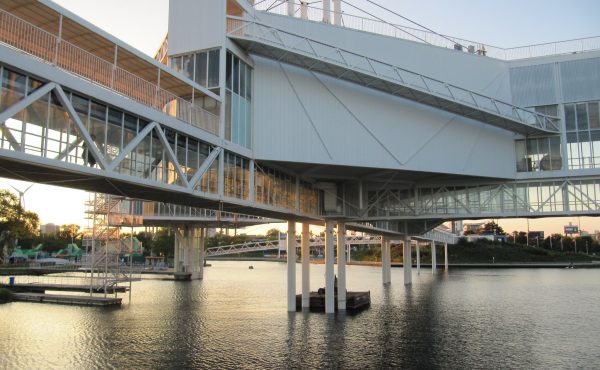TTC chair Adam Giambrone is sounding the alarm on the potential for provincially-mandated privatization of public transit just hours after the launch of Metrolinx’s launch of its $50 billion, 25 year regional transportation plan. 
In a Facebook status update, the TTC chair wrote Adam Giambrone “is worried that Metrolinx and IO (Infrastructure Ontario) are looking at private transit operations.”
In a follow-up e-mail exchange with Giambrone’s executive assistant Kevin Beaulieu, Spacing was told that the concern stems from Giambrone’s understanding that Infrastructure Ontario, an agency of the new super ministry headed up by Minister George Smitherman, would be “involved in AFP (Alternative Finance and Procurement) screening.â€
The release of the Metrolinx document had been delayed due to disagreements with the TTC on how to integrate its Transit City plan into the regional plan and other politically uncomfortable topics like the use of road tolls or other taxes to pay for the plan. According to reports from the Toronto Star, the question of finance remains largely unaddressed beyond the money promised by the provincial government in its previously announced $17.5 billion Move2020 plan.
Spacing has not been provided with a copy of the Metrolinx report released today but it does not appear to be online at this time appears online here.
Photograph courtesy City of Toronto




21 comments
The link to the draft plan is buried within the PDF agenda for Friday’s meeitng. Here’s the direct path:
http://www.metrolinx.com/Docs/1/Board/Sep08/PP%2008-013%20Draft%20RTP%20-%20Appendix%20A.pdf
As always, I would advocate for studying case studies in other cities should this topic develop further. London is not a great comparison, since it has some unique issues and is a much more complex system. Melbourne would be a must-see, since they have a system very similar to Toronto’s streetcars/buses/GO trains, and it was fully privatized some time ago. Whatever the results in Melbourne, they should be a very close predictor for Toronto.
Inter-agency bickering…. I don’t really care how mass transit happens. Just has to happen somehow. Our public institutions are not exactly shining examples of success.
I have trouble understanding why someone would be upset about an organization thoroughly evaluating all of its financing alternatives before spending $20+ billion of taxpayer money..
Privatization need not be a bad thing, provided that the public agency maintains control of the fares, services levels and other performance measures. A situation like the 407, where the project is literally sold to a private company, has been proven to be a bad idea in Ontario. A situation where the private sector provides the drivers and mechanics but is accountable to the government in EVERY respect (like GO Transit) is something that should be debated openly and fairly.
Hardly a shock, given the Feds have also been pushing it. Dublin’s LUAS LRT was done as a PPP by Veolia and it is performing well ahead of the state-run bus and heavy rail in terms of customer focus and is profitable on an operating basis.
Heads-up for the Chairman – most riders don’t give a stuff who drives the bus as long as the vehicle is prompt, fast, clean with an affordable fare. I’d venture that in their heart of hearts even a majority of Spacers don’t demand city ownership of transit, just a single payer system where one fare works on buses, streetcars and subways, with universal branding irrespective of the corporate owner of the equipment or employer of the driver.
Maybe Adam G could keep his eye on stuff that’s way overdue and which sap the belief in Torontonians that TTC has the ability to bring in projects…
For example MTA New York just announced Google Transit for New York (maps.google.com/nyc) when TTC were supposedly negotiating with Google months ago. Vancouver, Ottawa, Montreal has it too – even Fredericton! What about it Mr Chairman? The Commission first asked staff about this 33 months ago!
AFPs, P3s, whatever you want to call them, could either be a blessing or a curse. There have been some scandalous P3s in our time – Brampton Civic Hospital, the 407 privatization deal, the undead Blue22; but sometimes they can work – Vancouver might be another role model, as the so-called “Canada Line”, a P3 project to build rapid transit to YVR and Richmond, has been built rather quickly, with the private sector bearing the risks of cost overruns. It will be integrated into the rest of the Translink network, with the public paying the same fares as if it were publicly run. It can work, but most Toronto region examples (of which most are Harris-era) have had poor results.
Also note that all of York Region’s transit operations are contracted out to private operators, or to the TTC or Brampton Transit for the joint routes. I believe parts of Durham Region’s services are also contracted.
I doubt that Metrolinx is calling for privatization of transit operations, particularly existing services, but rather privatization of new rapid transit and highway construction. Some further clarification would be useful. We also need to be extremely careful if we head down this road.
I think Mark and Andrae nail it on the head.
We do have instances where private companies have taken over public services and have provided even worse services (Etobicoke garbage collection, EUCAN garbage bins, 407).
Its a crapshoot going the PPP way and there is no guarantee it will work. I think if they want to offer privately owned mass transit it should be experimented in a smaller region first, not within the Toronto regions.
But city services, like transit, are not specifically made to be money-winners, nor do they function like regular businesses — they are meant to provide cheap transit options for residents.
Its a very murky situation to say Yes, Privitization Will Work, and just as difficult to assume that Yes, Public Ownership Is The Best Option.
To me, privatization means that the shareholders will want a return on their investment.
So do you want to put your own money in a term deposit and earn 4% safely or take a risk and hope your return on the transit company you own will return 10%?
To me, privatization will mean getting rid of low performing routes, more crowded vehicles, limited service, neglect, and not listening to the public. The reasons why the Toronto Railway Company (TRC) was taken over by the Toronto Transportation Commission (TTC) in 1921.
Outsourcing operations in 5-year contracts is not a bad idea, I have seen it work well for other cities.
The frightening part of privatization is when it involves selling public infrastructure.
This brings to mind the 8 nuclear reactors we privatized. The publicly owned assets have actually performed better than the private ones at a lower cost.
This is an area where we should probably look to European examples: there are probably plenty.
Accept reality. There are NO guarantees regardless of who owns what.
At some point a decision must be made and to date TTC has demonstrated it is incapable and unwilling to move forward at any speed reflective of the last quarter century.
And this current chairman is certainly no example of business experience.
Either build a corporation that has the capabilities or partner with a group but continuing with these politicians-pretending-to-be- qualified-business-people is a waste of time and money.
And that is a case study with too many examples.
“privatization will mean getting rid of low performing routes, more crowded vehicles, limited service, neglect, and not listening to the public.”
That shows a limited recognition of what “privatization” can entail. TTC (or Metrolinx) can simply be a brand and operations shell which determines routes, frequency and fares. They then contract operators to staff the vehicles (as Bombardier are doing for GO), maintain them etc.
Private operators would have no say in which routes were chopped or increased, they would simply be bidders on routes offered by TTC/Metrolinx. Air Canada operates under this principle with the flights operated by Jazz and Air Georgian under its brand and flight codes.
The advantage of such a scheme would be that it would be difficult for a single transit union to paralyse the system entirely, since some contractors could use different unions with different collective agreement termination dates or even be non-unionized.
Making use of private sector expertise in the building and running of public systems can be wonderful. In a competitive market, focus on attracting customers can certainly lead to improved performance and comfort.
Which is something that the GTA desperately needs in a transit system.
(Who knows–if the streetcar system was privatized, a focus on profit instead of sticking with previous decisions might get the Queen streetcar scheduling changed and running efficiently.)
But there are very good reasons that most of the services provided by the public sector are provided by the public sector.
Unless heavily subsidized, the private sector will not want to run money-losing lines, instead cherry-picking the most profitable routes (which is exactly what Toronto faced before the TTC). And any subsidy is going to have to be enough to give a private company their profit, i.e. a waste of taxpayers’ money.
There also wouldn’t be direct competition between different providers. A privatized transit system would either leave one company running everything (i.e. what we have now, except without any respect for the public interest) or divvy up different modes and geographic areas between different companies. Regional rail/subway/lrt/bus all serve slightly different purposes and are not really in direct competition. And if you live in one corner of the City, the fact that there are different providers in different parts of the City helps you not a whit. Without direct competition, the private sector is likely to gouge you more, not less, than the public sector.
Finally, public transit (like many other fields that are littered with failed PPPs) is too important a function for a government to allow fail. When operator’s of London’s system went under, they couldn’t be held accountable–everyone knew that the government could not afford to shut down chunks of the underground and would put up the money to fix it up and keep it running despite anything their contract might have said.
Two quick points:
1. Transit expansion in Toronto should be tied to employment growth. Expanding transit in a city that has lost jobs during ‘boom’ times makes little sense. As the Spadina/Lakeshore LRT has shown, if you build it they won’t necessarily come.
2. Is Adam Giambrone cause for alarm worth heading? As the individual whom seriously considered a ‘fast ferry’ service one has to call into question his judgment.
Hong Kongs MTR is a private business and it’s the most efficient transit system in the world. Also a hell of a lot cheaper than anything we have here.
I say bring on the privatization.
This Glen guy seems like a one-axe-to-grind repeater, so I think we can consider his comments as seriously as we would any axe-grinder.
Elaine, care to dispute anything that I have said?
The tax issue that I go on about, while you may think otherwise, has ramifications that go beyond simple dollars and cents. Toronto needs a healthy non residential tax base because it subsidies residents. While you may not see it, our Mayor has………
“Employment growth within the city is important for fiscal, social and environmental reasons. A shrinking business and property tax base diminishes Toronto’s ability to adequately provide the social services and other public amenities that are the hallmark of a just and caring society.
Environmental Impacts of Office Location
Annual Impact Downtown Toronto Surrounding Regions
Transit trips 634,800 57,363
Auto kms. 3,259,300 11,153,700
Fuel use (l.) 291,025 995,925
Emissions (kg.) 940,800 3,129,500
Then, there are the personal stresses of long commutes stuck in traffic gridlock to drive to a job that go hand in hand with increased fuel consumption and increased emissions that contribute to environmental stress. It also means that people who do not have access to a car have reduced access to job opportunities. Toronto runs the risk of becoming a “bedroom community†if we don’t take action now.”
The current commissioners of the Toronto Transit Commission are all politicians.
Originally, the Toronto Transit Commission and its predecessor, the Toronto Transportation Commission, were civilians. Over time, politicians were welcomed, but soon the TTC evolved to be all politicians.
It is time that civilians be returned to be, maybe, half of the quorum. Then we can get businesspeople and transit-focused people on the commission, instead of politicians who are only interested in getting elected in the next election in their ward.
Private = profits.
uSkyscraper mentioned Melbourne as an example to look at. There system works well, but there is something in the contracts with the private operators that I don’t expect our transit operators to have the balls to insist on: performance penalties.
In Melbourne, each month the private operators must make certain performance targets. If the operation does not meet the target, the contractor provides each user who held a monthly or yearly pass in that month with a one-day pass. This applies to the trams (operated by Yarra Trams) and the trains (operated by Connex/Veolia).
For the trams, they must provide 95% of service kilometres (cancelled runs and SHORT TURNS are what we are talking about!) and be on time at least 80% of the time. In August, they provided 99.25% of service and were on time (defined as being within 1 minute early and 6 minutes late) 83.34% of the time.
For the trains, their target is to provide 98% of service kilometres and to have 92% of trains arrive on time (defined as being within 5 minutes of scheduled time). In August, 99.1% of service was delivered and 93.5% were on time.